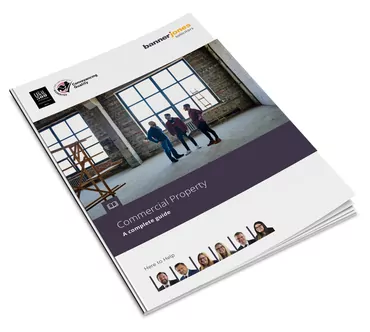Choosing a Commercial Property
Whether you’re a small business owner looking for new premises, or a large corporation in need of new headquarters, the property you occupy is usually a fundamental part of your business.
This guide will help you understand what to look for in finding and buying the ideal commercial premises for your needs.
Commercial properties can offer a range of benefits for businesses of all sizes. Whether you choose to purchase or lease a property, it’s important to carefully consider factors such as location, cost, financing, legal requirements, and maintenance needs. Working with experienced professionals, such as Banner Jones, can help ensure a smooth and successful process.
Types of commercial properties
There are several types of commercial real estate properties available, including office buildings, retail spaces, warehouses, apartment buildings and industrial units.
Location
The location is important for several reasons, including accessibility, parking, visibility, and proximity to potential customers or clients. It’s important to consider the demographics of the local area and the potential for growth when choosing a location for your commercial property. It is also a good idea to review any plans that your local council may have for that area, just in case that may impact the property location further down the line.
Cost
Commercial properties can be expensive to purchase or rent, so it’s important to consider your budget before making a decision. Factors such as location, size, and quality of the property can all impact the cost.
Financing
Financing options for commercial properties typically involve a combination of equity and debt financing. Equity financing involves investing your own money or seeking out investors to help fund the purchase or expansion of the property. Debt financing involves obtaining a loan from a lender to help finance the purchase or development of the property. Typically a lender would expect a charge on the property as security for their loan.
Leasing
Many commercial properties are leased rather than purchased outright. Leasing can provide more flexibility and lower upfront costs, but also comes with its own set of challenges and obligations.
Maintenance and upkeep
Maintaining a commercial property can be costly and time-consuming, but it’s important for the long-term success and value of the property. Regular maintenance and repairs can help prevent larger issues down the line.
Which is Best? Rent? Or Buy?
If you are looking to move your business, there is an important decision to be made around whether you should buy or rent premises. There are several factors you should consider and making the right decision can be challenging.
Buying - the pros and cons:
Potential investment opportunity
PRO - With any property purchase, buying a commercial property could be seen as an investment. The property may increase in value, and when you own your business premises, you can profit from this increase instead of your landlord. You can also offset the interest paid on the mortgage against your net profits.
CON - However, you may need a large deposit to secure the property - often around 20-30% of the purchase price - which may not be viable for smaller businesses. It is possible that the property could decrease in value too, which could mean that you owe your lender more than the property is worth. Investing in property is always a risk, so you should consider carefully before deciding to buy.
Planning your business’s financial future
PRO - Another key benefit is that you can plan better for your costs. With a commercial property, you may be able to fix your mortgage payments for a set number of years.
CON - However, when you rent, you may be subject to rent increases making it harder to create business projections. It can also make doing business more difficult where you are operating on tight margins. A large rent increase could even make your operation no longer viable. On the other hand, if you have a variable rate mortgage on the property, payments can rise by a significant amount, so this may not be as much of an advantage as you might think.
Option to sell
PRO - Although you can fix your mortgage payments for a long period, you may find that your business premises need to change or are no longer fit for purpose. If you own your commercial premises, you can sell whenever you want.
CON - However, if you are renting, you may be tied into a lease that can be tricky. Some commercial premises have lease terms of up to 15 years, and unless you have negotiated a break clause, your only way ‘out’ of the lease would be to find an assignee to step into your shoes, and even then it is likely that you would need to give a guarantee.
Making necessary changes to the premises
PRO - When you own your business premises, it allows you to make any changes to the property that you see fit subject to planning contracts. Making such changes can be crucial to business operations, and this freedom should be a key consideration when you are thinking about buying or renting a commercial property. You can also sub-let all or part of the building, which is often not possible when you are renting. You may, of course, be able to make changes if you rent a property, but this will be subject to obtaining the landlord’s permission (which may include a caveat to reverse the alteration at the end of the lease).
Renting - the pros and cons:
Faster and more straightforward
PRO - Typically, the process of getting into a rented commercial property is much quicker and more straightforward. You can cut out the process of securing a mortgage and conveyancing, allowing you to relocate quickly.
No large deposit required
PRO - Similarly, you won’t need to save up a large deposit to rent a property, making getting new premises easier for smaller businesses. If your business has good cash flow, you could end up renting a great space you could never afford to buy, boosting the image of your business. Note however, that the landlord may require you to pay a rent deposit (a payment made to the Landlord at the start of a lease, usually of 3-6 months rent, which would be the Landlords security in case rent is unpaid or late at any point during the lease).
Subject to lease conditions
CON - There are of course disadvantages to renting, mainly that you will be subject to the conditions of your landlord. You may need to pay for repairs where you are on a ‘full repairing’ lease, and any changes you make could add value to your landlord’s property at the expense of your business.
Rent increases
CON - Above we talk about rent increasing during the term of a lease, however, it is important to remember that a properly drafted commercial lease sets out the basis of any reviewed rent. It is usually by reference to open market rent or the retail prices index, and rent reviews would only be allowed on set dates agreed at the outset.
The Costs of Buying a Commercial Property
In addition to the price of the property, there are other costs to consider, including commercial property tax.
Stamp Duty Land Tax (SDLT)
In England and Northern Ireland the current threshold is £150,000 for a commercial or mixed area property. For property up to £250,000, the SDLT rate is 2%, while over £250,000 has a 5% rate.
Other costs to consider could include:
- Advice from professionals such as commercial property advisors, accountants, consultants, lenders and solicitors
- Decorating, building adjustments, repair costs and upgrades
- VAT
- Commercial mortgage arrangement fees
- Surveyor and legal fees
- Environmental compliance costs
- Waste management
- Office furniture and equipment
- Moving costs
- Business rates for commercial properties
- Buildings insurance
- Operational and maintenance costs
Financing a Commercial Property
You don’t necessarily need to be ‘wealthy’ to invest in commercial property. There are several options available.
Commercial Mortgage
Commercial mortgages are usually the most suitable option for businesses wishing to buy a property. It works the same as a residential mortgage; you pay a deposit, and then make monthly repayments either made up of capital and interest or interest-only. With many lenders offering varying interest rates, it’s important to identify the most suitable for your business.
Business Loan
If you’re looking for a short-term or more flexible way to finance your commercial property purchase, you could consider a different type of loan for commercial property. You could use a business loan to either fund part, or all of the transaction.
Asset Based Lending
If your business already has other substantial assets, asset based lending can be a good way to release the cash tied up in them, to be re-invested into buying commercial property. This may be a solution to raising the necessary deposit and could be used alongside a mortgage or other funding solution.

- Director
- Solicitor
- Head of Business Legal Services


